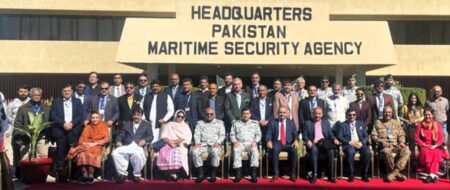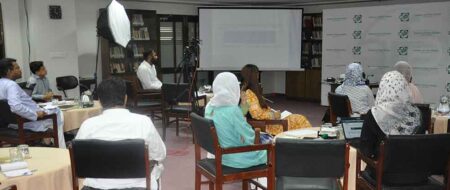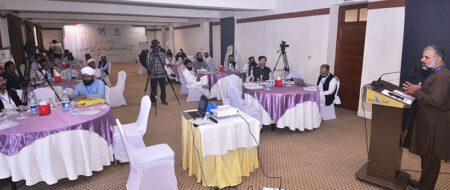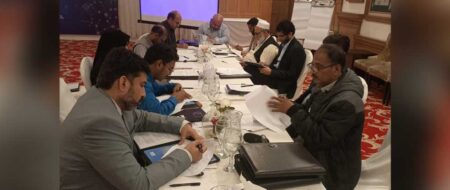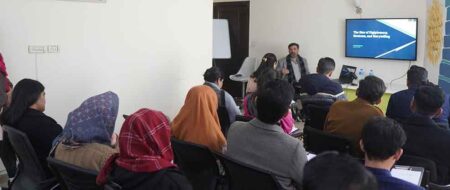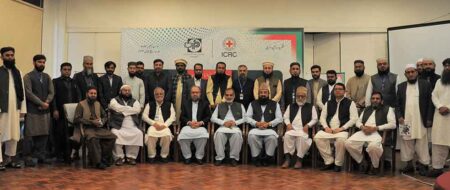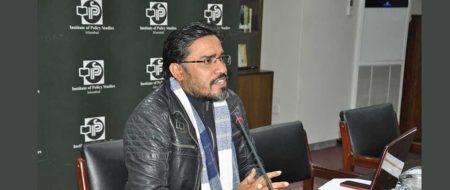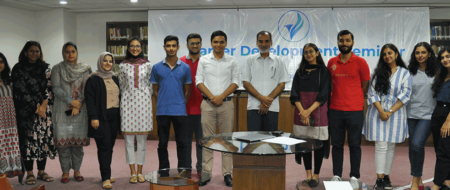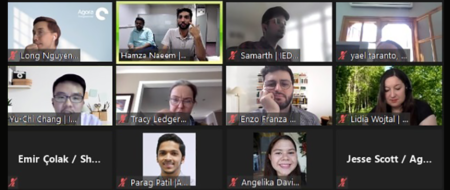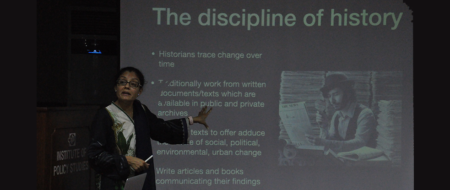In-house Staff Development Program seeks to enhance and improve upon the research and professional skills and broaden the intellectual horizon of the research team. In this context, three sessions have been organized.
As part of the in-house Staff Development Programme (SDP) that seeks to enhance and improve upon the research and professional skills and broaden the intellectual horizon of the research team, three sessions have been organized with Prof. Khurshid Ahmad, Chairman IPS, Dr. Safir Akhtar, IPS Associate, and Mr. Nasrullah Mirza, Lecturer, Quaid-i-Azam University, Islamabad as resource persons respectively.
Prof. Khurshid Ahmad delineated on the importance of understanding the emerging national, regional and global issues in the contemporary context while carrying out the research activities. Emphasizing rapidly changing political, economic and cultural realities of the world with the emergence of new poles of powers, he explained that a collaboration of the Asian countries, especially China and the Muslim World, could bring out very positive outcome for the world in the 21st century.

He urged the researchers to focus more on the applied research for a substantial and positive policy formulation and keep the current geopolitical situation in view while executing research studies on Afghanistan, Iran, Central Asia and the Middle East. He maintained that research was not a superficial job; it rather required more depth, concreteness and precision adding a researcher must set the research objective(s) of the study prior to embarking on any research project.
He recommended some reading material and books for stirring the thought process for carrying out research. While expressing his views on book reading, he said that a researcher should be voracious reader but he must ‘chew and digest’ the classic books concerning his specific field of research.
In the second session of the SDP, while expressing his views, Dr. Safir Akhtar enlightened the participants regarding the various aspects of research and shared his own research experience of working in the national and international seats of learning.
He emphasised that research was meant for the significant addition in any area of knowledge adding that fundamental duty of a researcher is to explore the new facts and bring into limelight the novel aspects of his field of research with comprehensive but objective analysis.

Dr Akhtar said that the modern age was the era of specialization and every researcher must grasp the general concepts of basic fields of knowledge while focusing on the in-depth knowledge of his specific area of research. “A researcher must keep himself/ herself abreast of the latest developments in all the fields along with developing expertise in his/her area of research.” he added.
Terming the languages as the windows of knowledge, he underlined the need to learn as many languages as necessary for an ideal research study in the areas of utmost significance in the contemporary world.
While talking about the research ethics, he said the researcher must come up with his original contribution and shun the act of plagiarism in his/her research study. “There is no room for plagiarism in research”, he maintained.
On paper writing, he argued that paper writing was more technical than writing a book. “A paper deals with some new aspect or angle; however a book does not necessarily brings out any significant addition to the existing literature,” he observed.
In this fast changing world of ours, perfectionism is ideal if it is obtained ‘not at the cost of time and deadlines,’ he concluded.

In the third session Dr. Nasrullah Mirza, discussed that although gathering of information and re-producing it increased the accessibility of already available knowledge, but the real contribution in research would be making the inaccessible knowledge accessible through an objective and balanced analysis of facts. “A researcher has to be very critical, and objective that can be observed even while maintaining a certain perspective and reference point,” he suggested.
Dr. Mirza was of the view that identification of the problem/question was “the hardest task” within a research project. Besides, he added, justification and rationale of the research were very important.
The experienced researcher and teacher of Research Methodology also shared various stages of research from posing the question(s) to setting the goals, data gathering and analysis.

 He urged the researchers to focus more on the applied research for a substantial and positive policy formulation and keep the current geopolitical situation in view while executing research studies on Afghanistan, Iran, Central Asia and the Middle East. He maintained that research was not a superficial job; it rather required more depth, concreteness and precision adding a researcher must set the research objective(s) of the study prior to embarking on any research project.
He urged the researchers to focus more on the applied research for a substantial and positive policy formulation and keep the current geopolitical situation in view while executing research studies on Afghanistan, Iran, Central Asia and the Middle East. He maintained that research was not a superficial job; it rather required more depth, concreteness and precision adding a researcher must set the research objective(s) of the study prior to embarking on any research project. Dr Akhtar said that the modern age was the era of specialization and every researcher must grasp the general concepts of basic fields of knowledge while focusing on the in-depth knowledge of his specific area of research. “A researcher must keep himself/ herself abreast of the latest developments in all the fields along with developing expertise in his/her area of research.” he added.
Dr Akhtar said that the modern age was the era of specialization and every researcher must grasp the general concepts of basic fields of knowledge while focusing on the in-depth knowledge of his specific area of research. “A researcher must keep himself/ herself abreast of the latest developments in all the fields along with developing expertise in his/her area of research.” he added. In the third session Dr. Nasrullah Mirza, discussed that although gathering of information and re-producing it increased the accessibility of already available knowledge, but the real contribution in research would be making the inaccessible knowledge accessible through an objective and balanced analysis of facts. “A researcher has to be very critical, and objective that can be observed even while maintaining a certain perspective and reference point,” he suggested.
In the third session Dr. Nasrullah Mirza, discussed that although gathering of information and re-producing it increased the accessibility of already available knowledge, but the real contribution in research would be making the inaccessible knowledge accessible through an objective and balanced analysis of facts. “A researcher has to be very critical, and objective that can be observed even while maintaining a certain perspective and reference point,” he suggested.

